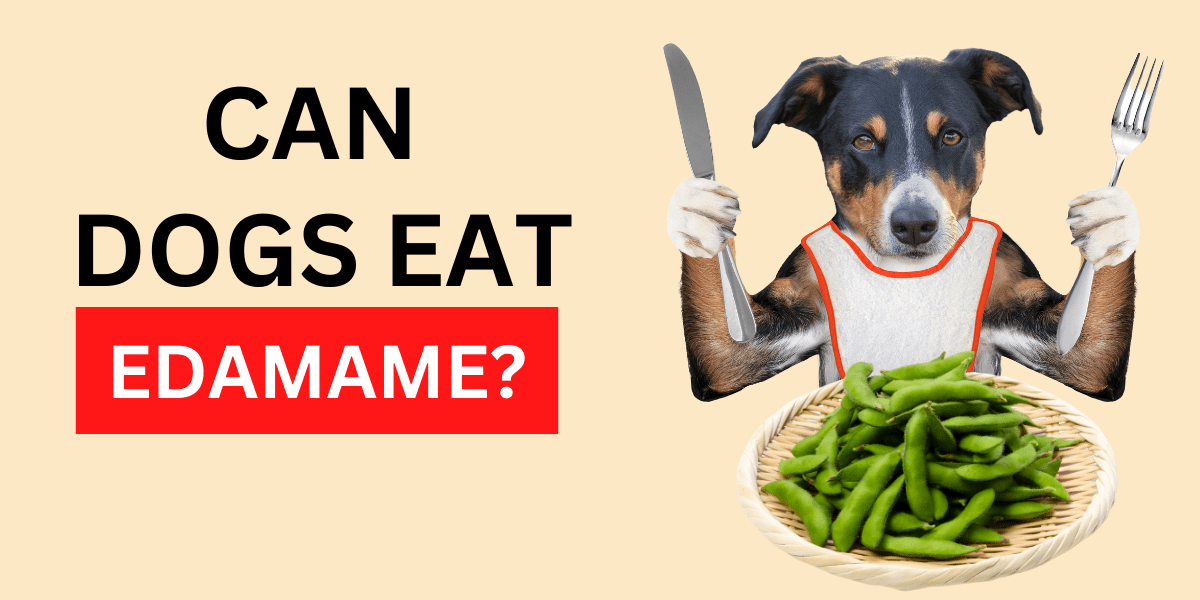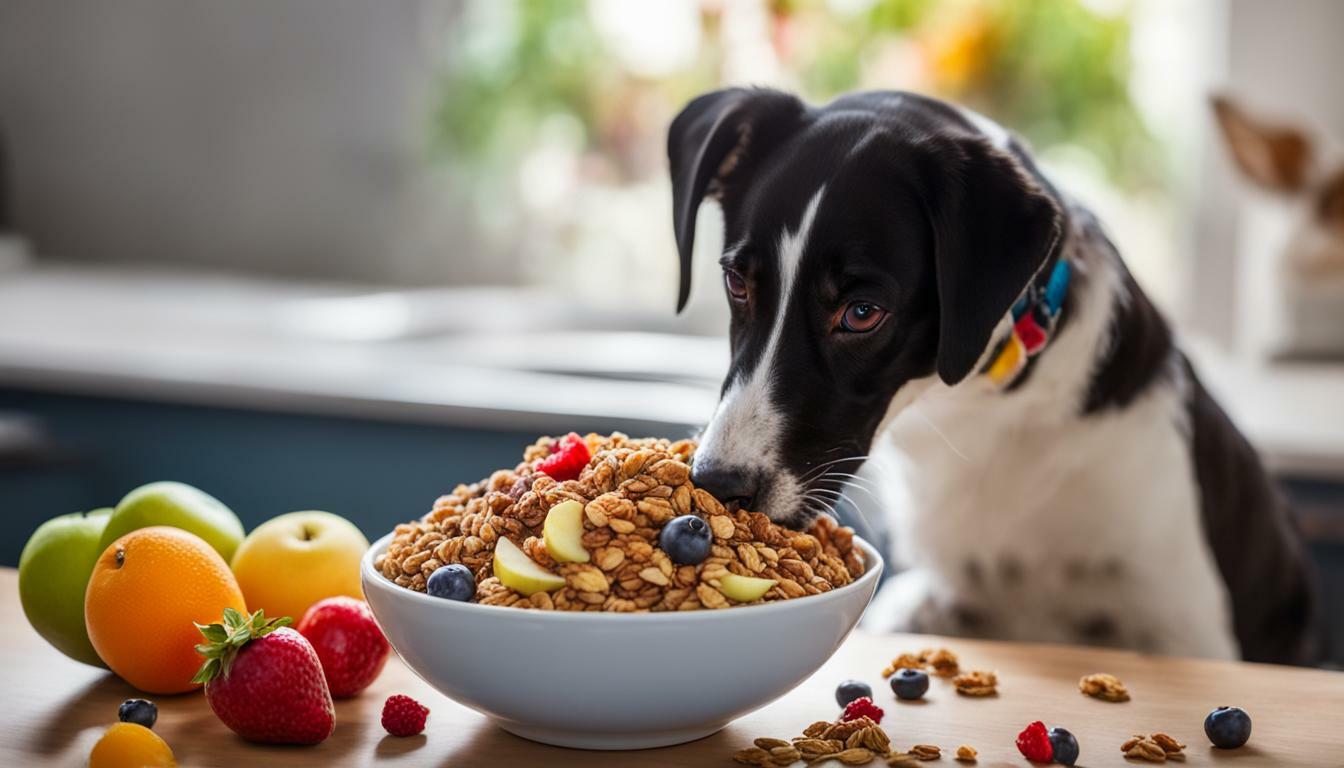
Many dog owners wonder if it is safe to give granola to their furry companions. While granola may seem like a healthy snack option, it’s important to understand the potential risks and benefits before offering it to your dog.
Granola can contain ingredients that are toxic to dogs, such as chocolate, raisins, and xylitol. These ingredients can cause serious health issues and should be avoided in your dog’s diet. Additionally, store-bought granola is often high in sugar and sodium, which can lead to obesity and dehydration in dogs.
However, some ingredients in granola, such as oats, puffed rice, and certain seeds, can provide nutritional value to dogs. It’s important to note that these ingredients should be used in moderation and as part of a balanced diet.
Key Takeaways:
- Granola can contain toxic ingredients for dogs, such as chocolate, raisins, and xylitol.
- Store-bought granola is often high in sugar and sodium, which can be harmful to dogs.
- Oats, puffed rice, and certain seeds in granola can provide nutritional benefits for dogs, but should be used in moderation.
- It is best to make your own dog-friendly granola or choose dog-specific granola bars to ensure the safety of your pet.
- Always consult with your veterinarian before introducing any new foods into your dog’s diet.
The Dangers of Granola for Dogs
While granola may seem like a healthy snack for humans, it can actually be harmful to dogs. Certain ingredients commonly found in granola can be toxic to our canine companions, posing serious risks to their health. It is important for dog owners to be aware of these dangers and make informed choices when it comes to their pet’s nutrition.
Chocolate: One of the main ingredients in granola that is toxic to dogs is chocolate. Chocolate contains theobromine, a compound that can be poisonous to dogs, especially in large quantities. Even small amounts of chocolate can cause symptoms such as vomiting, diarrhea, rapid breathing, and in severe cases, seizures or even death.
Raisins: Another potential hazard in granola is raisins. Raisins and grapes can cause kidney failure in dogs, leading to symptoms like decreased appetite, lethargy, and increased thirst and urination. It is best to avoid giving your dog any granola that contains raisins, as even a small amount can be harmful.
Xylitol: Xylitol is a sweetener often used in granola and other food products. While it is safe for humans, it is highly toxic to dogs. Xylitol can cause a sudden release of insulin in dogs, leading to a dangerous drop in blood sugar levels. Symptoms of xylitol poisoning in dogs include vomiting, loss of coordination, seizures, and in severe cases, liver failure. It is crucial to always check the ingredient list for xylitol in granola before giving it to your dog.

When feeding your dog, it is essential to prioritize their well-being and avoid any potential risks. Therefore, it is generally best to steer clear of giving granola to your furry friend. Instead, opt for dog-friendly treats that are specifically formulated to meet their nutritional needs. By doing so, you can ensure your dog’s safety and overall health.
Health Risks of Store-Bought Granola for Dogs
Store-bought granola can pose several health risks to dogs, including obesity and dehydration. Many commercial granola brands contain high levels of sugar and sodium, which can lead to weight gain and water retention in our furry friends. Obesity in dogs can result in a multitude of health issues, including joint problems, heart conditions, and reduced lifespan.
In addition to the high sugar and sodium content, store-bought granola may also contain ingredients that are toxic to dogs. Chocolate, raisins, and xylitol are commonly found in certain granola varieties and can be extremely dangerous for canines. Chocolate, in particular, contains theobromine, a stimulant that dogs cannot metabolize effectively. Even a small amount of chocolate can lead to symptoms such as vomiting, diarrhea, and in severe cases, seizures or even death.
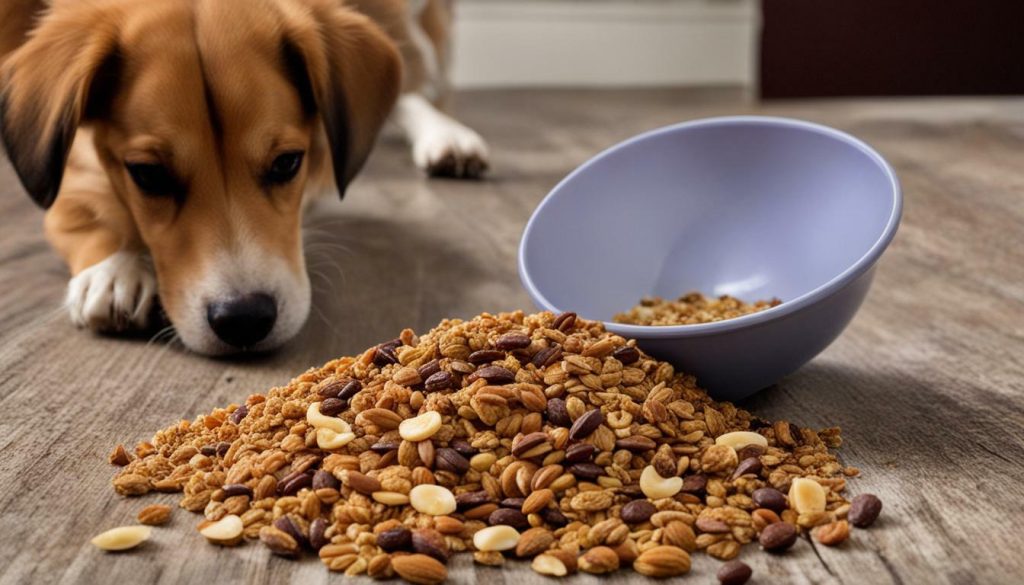
It is important to carefully read labels and avoid giving dogs store-bought granola that contains harmful ingredients. Instead, consider making your own dog-friendly granola at home or choose dog-specific granola bars that are specially formulated to meet their nutritional needs. By doing so, you can ensure that your beloved pet enjoys a tasty and safe treat without compromising their health.
| Granola brand | Sugar content per serving | Sodium content per serving |
|---|---|---|
| Brand A | 10g | 50mg |
| Brand B | 15g | 80mg |
| Brand C | 20g | 100mg |
Granola Brands Comparison
“Choosing the right granola brand is crucial for your dog’s health. Always check the sugar and sodium content per serving to avoid potential health risks.” – Dr. Amanda Johnson, Veterinarian
By being cautious about the granola brands you choose for your dog, you can help them maintain a healthy weight and reduce the risk of developing diet-related health issues. Remember to consult with your veterinarian before introducing any new treats or ingredients into your dog’s diet to ensure they are suitable for your pet’s specific needs.
Beneficial Ingredients in Granola for Dogs
While granola may have some beneficial components for dogs, it is important to be cautious and mindful of the ingredients used. Certain ingredients in granola, such as oats, puffed rice, and certain seeds, can provide nutritional value to our furry friends.
Oats are a great source of dietary fiber, which can aid in digestion and promote a healthy gastrointestinal tract. They also contain important minerals like iron and manganese, which are essential for a dog’s overall well-being. Puffed rice, on the other hand, is a low-calorie ingredient that adds crunch to the granola without adding excessive amounts of fat or sugar.
Certain seeds, such as flaxseeds and chia seeds, are rich in omega-3 fatty acids, which are beneficial for a dog’s skin and coat health. These seeds also provide a good source of plant-based protein, helping to support muscle development and repair.
When incorporating these beneficial ingredients into a dog’s diet, it is crucial to practice moderation and proper portion control. While granola can be a tasty treat for your pet, it should not replace their regular balanced meals. Always consult with your veterinarian to ensure you are meeting your dog’s specific dietary needs.

Making Your Own Dog-Friendly Granola
If you’re interested in feeding your dog granola, it’s best to make your own dog-friendly version. This way, you have complete control over the ingredients and can ensure that it’s safe for your furry friend. Making dog-friendly granola is a fun and creative way to provide a nutritious and delicious snack for your pet.
Here’s a simple recipe for homemade dog-friendly granola:
- Start by preheating your oven to 300°F (150°C).
- In a mixing bowl, combine 2 cups of rolled oats, 1 cup of unsweetened puffed rice, and ¼ cup of pumpkin or unsweetened applesauce.
- Add in 1 tablespoon of honey or maple syrup to lightly sweeten the granola (optional).
- Mix in a tablespoon of ground flaxseeds or chia seeds for added nutrition.
- Spread the mixture evenly on a baking sheet lined with parchment paper.
- Bake for about 30 minutes or until the granola is golden brown and crispy.
- Allow it to cool completely before serving it to your dog as a tasty treat.
This homemade dog-friendly granola is free from harmful ingredients like chocolate, raisins, and xylitol, which are toxic to dogs. It contains oats and puffed rice, which provide fiber and energy. Additionally, the ground flaxseeds or chia seeds offer essential omega-3 fatty acids for a healthy coat and skin.
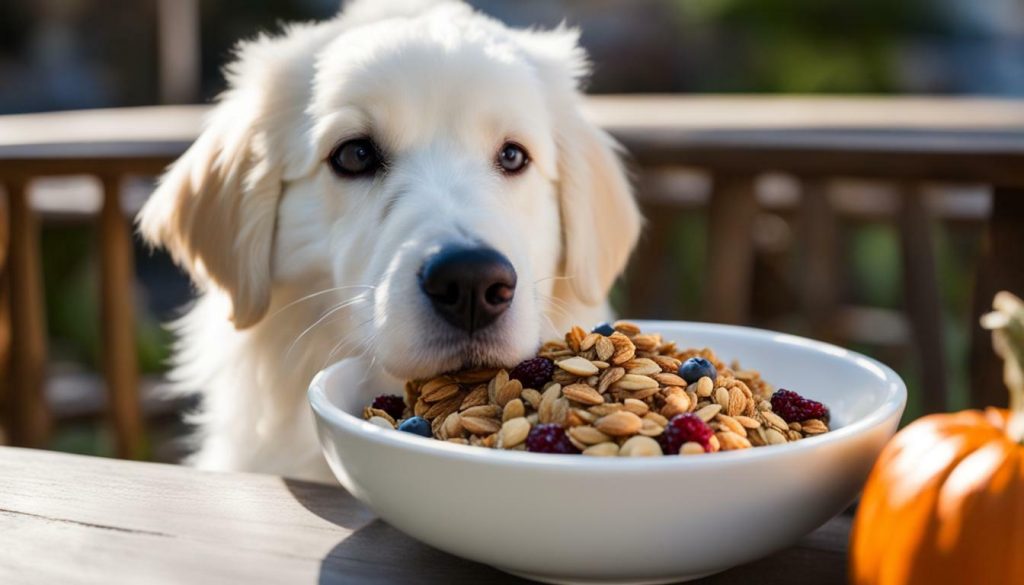
Your dog will love the crunchy texture and delicious flavors of this homemade granola. Remember to serve it in moderation and adjust the portion size based on your dog’s size, age, and activity level. It’s always a good idea to consult with your veterinarian before introducing any new food into your dog’s diet.
Dog-Specific Granola Bars
For dog owners looking for convenient and safe options, there are dog-specific granola bars available on the market. These bars are specially formulated to meet the nutritional needs of dogs while excluding ingredients that can be harmful to them. They make for a great on-the-go snack or a reward during training sessions.
One popular brand that offers dog-specific granola bars is Bark Bites. Their bars are made with wholesome ingredients like oats, peanut butter, and dried fruits that are safe for dogs to consume. These bars are free from chocolate, raisins, and xylitol, which are toxic to canines. With Bark Bites, you can feel confident that you are giving your furry friend a tasty treat without compromising their health.
When choosing dog-specific granola bars, it’s important to read the labels and ensure they do not contain excessive amounts of sugar or sodium. Look for bars that are low in added sugars and have moderate sodium content. It’s also a good idea to consider your dog’s size, age, and dietary needs when selecting the appropriate size and flavor of granola bars.
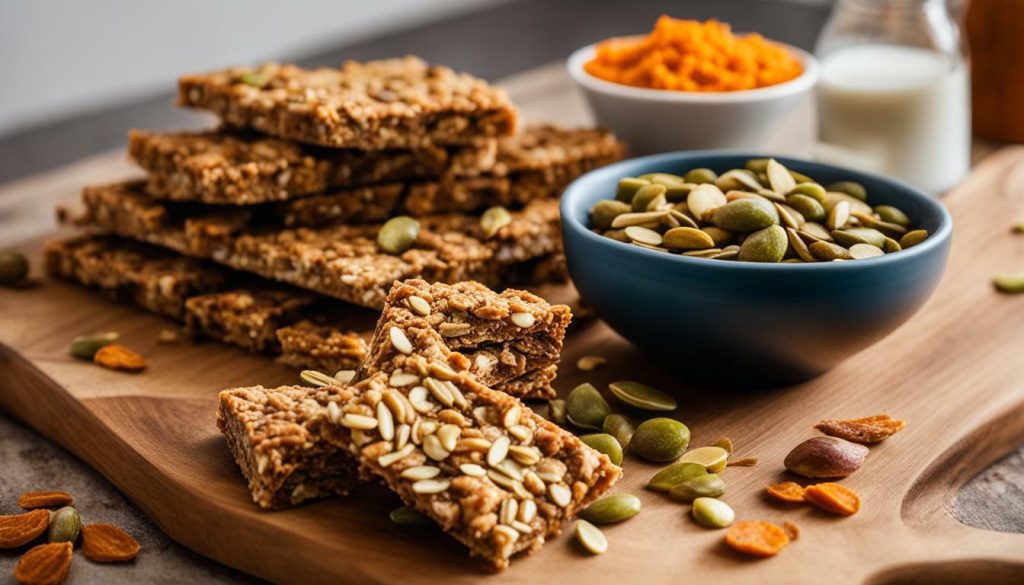
By opting for dog-specific granola bars, you can provide your canine companion with a safe and delicious snack. Remember to always practice moderation and portion control when offering treats to your dog, including granola bars. These bars can be a convenient option for busy pet parents who want to provide their dogs with a nutritious and enjoyable snack.
Granola and Allergies in Dogs
Just like humans, dogs can develop allergies, and granola may contain ingredients that can be problematic for dogs with allergies. Some common allergens in granola include nuts, seeds, and certain fruits. If your dog has a known allergy to any of these ingredients, it is best to avoid feeding them granola.
Allergic reactions in dogs can manifest in various ways, including itching, rashes, gastrointestinal issues, and respiratory problems. If you suspect your dog may have an allergic reaction to granola or any other food, it is important to consult with your veterinarian for proper diagnosis and guidance.
“It’s always better to be safe than sorry when it comes to your dog’s health. If you are unsure whether granola is safe for your furry friend, it’s best to err on the side of caution and choose alternative treats that are specifically formulated for dogs.”
When selecting dog-friendly treats, it is important to read labels carefully. Look for products that are free from common allergens and are specifically designed for canine consumption. Remember, moderation and portion control are key to maintaining a healthy diet for your dog.
| Allergenic Ingredients in Granola | Common Symptoms of Allergic Reactions |
|---|---|
| Nuts (such as almonds, walnuts, or peanuts) | Itching, rashes, swelling, vomiting, diarrhea |
| Seeds (such as sunflower seeds or pumpkin seeds) | Itchy skin, gastrointestinal upset, respiratory issues |
| Dried fruits (such as raisins or cranberries) | Upset stomach, vomiting, diarrhea |
By understanding the potential allergenic properties of granola and being mindful of your dog’s individual needs, you can ensure their well-being and prevent adverse reactions. If you are unsure about whether granola is safe for your furry friend, consult with your veterinarian for personalized advice.

When it comes to giving your dog treats like granola, moderation and portion control are key. While certain ingredients in granola can be beneficial for dogs, it is important to remember that not all granola is safe for our furry friends. Store-bought granola often contains ingredients that can be toxic to dogs, such as chocolate, raisins, and xylitol. Additionally, commercial granola tends to be high in sugar and sodium, which can lead to health problems like obesity and dehydration.
To ensure your dog’s well-being, it is best to make your own dog-friendly granola or choose dog-specific granola bars that are free from harmful ingredients and have appropriate levels of sugar and sodium. By making your own granola, you have full control over the ingredients and can tailor it to meet your dog’s specific dietary needs. You can use oats, puffed rice, and certain seeds to provide nutritional value without compromising their health.
When giving your dog granola or any other treats, it is important to follow recommended serving sizes based on their size, age, and activity level. Treats should always be given as a supplement to their balanced diet and not as a replacement for their regular meals. Overfeeding treats, including granola, can lead to weight gain and other health issues. Always remember that treats should be given in moderation and should not exceed 10% of their daily calorie intake.
Portion control guidelines for dog treats:
- Small dogs weighing under 20 pounds: Limit treats to ½ to 1 ounce per day.
- Medium dogs weighing between 20 and 50 pounds: Limit treats to 1 to 2 ounces per day.
- Large dogs weighing over 50 pounds: Limit treats to 2 to 3 ounces per day.
By being mindful of the ingredients and portion sizes of the treats you give your dog, you can ensure their overall health and well-being. Remember, moderation is key when it comes to treating our four-legged companions.

If you decide that granola is not the best option for your dog, there are plenty of alternative snacks that you can offer. These alternatives can provide similar nutritional benefits while ensuring the safety and well-being of your furry friend.
One option is to make your own dog-friendly granola using safe ingredients. You can use oats, puffed rice, and specific dog-friendly seeds to create a nutritious and tasty snack. By controlling the ingredients and portion sizes, you can tailor the granola to meet your dog’s specific dietary requirements. Remember to avoid harmful ingredients like chocolate, raisins, and xylitol, which can be toxic to dogs.
Another option is to choose dog-specific granola bars available in the market. These bars are formulated specifically for canine consumption and are often made with safe and healthy ingredients. When selecting dog-specific granola bars, make sure to read the labels and choose bars that do not contain excessive amounts of sugar and sodium. Opting for these bars can provide a convenient and nutritious snack option for your dog.
Additionally, there are other alternative snacks that you can offer your dog. Fruits and vegetables like apples, carrots, and blueberries can be a healthy and natural alternative to granola. These snacks are low in calories and can provide essential vitamins and minerals. Just be sure to remove any seeds, pits, or skins that can be harmful to your dog.
Table: Alternatives to Granola for Dogs
| Alternative Snacks | Nutritional Benefits |
|---|---|
| Homemade dog-friendly granola | Oats, puffed rice, dog-friendly seeds |
| Dog-specific granola bars | Convenient and formulated for canines |
| Fruits (apples, carrots, blueberries) | Low in calories, vitamins, and minerals |
Remember, when introducing any new snacks or treats into your dog’s diet, it’s important to do so gradually and observe any potential allergic reactions or digestive issues. Always consult your veterinarian for personalized advice and recommendations based on your dog’s specific needs and health conditions.
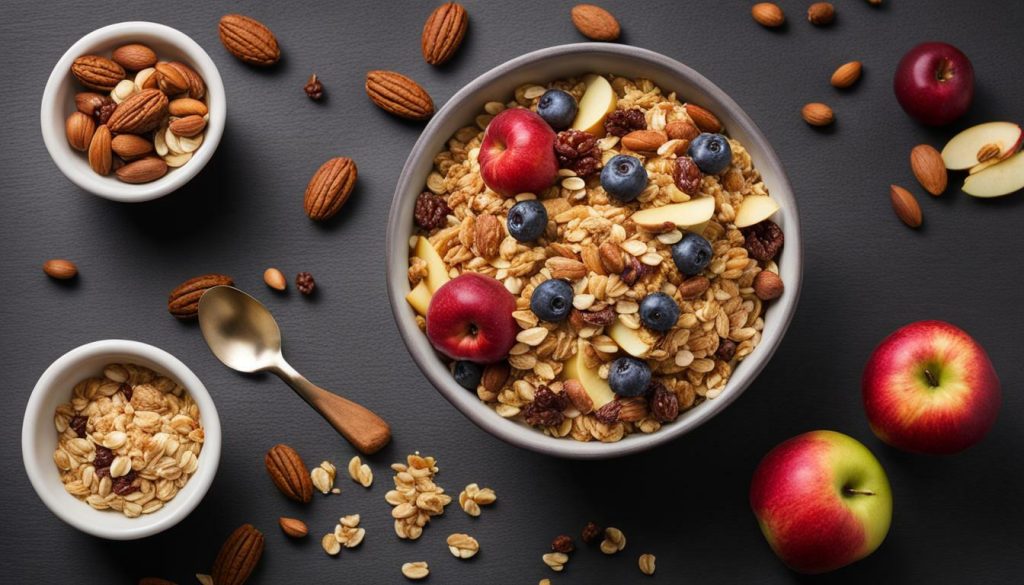
While granola may seem like a tasty treat for dogs, it is best to approach it with caution due to the potential risks it poses to their health. Granola can contain ingredients that are toxic to dogs, such as chocolate, raisins, and xylitol. These ingredients can cause serious health problems and even be fatal for our furry friends.
Store-bought granola is often high in sugar and sodium, which can lead to obesity and dehydration in dogs. These health issues can have long-term consequences and affect your dog’s overall well-being. It is essential to prioritize their health and make informed decisions about their diet.
While some ingredients in granola, such as oats, puffed rice, and certain seeds, can be beneficial for dogs, it’s important to ensure that these ingredients are safe and suitable for your pet. The best way to do this is by making your own dog-friendly granola using safe and nutritious ingredients or by choosing dog-specific granola bars that are specially formulated for canine consumption.
In conclusion, it is crucial to prioritize your dog’s health and well-being when considering adding granola to their diet. While there are some potential benefits to certain ingredients in granola, the potential risks and the presence of toxic ingredients make it a questionable choice for your pet. Consult with your veterinarian for guidance and consider healthier alternatives that are specifically designed to meet your dog’s nutritional needs.
FAQ
Can dogs eat granola?
No, it is not recommended for dogs to eat granola due to potential toxic ingredients and high sugar and sodium content.
What are the dangers of granola for dogs?
Granola can contain ingredients that are toxic to dogs, such as chocolate, raisins, and xylitol. Additionally, store-bought granola is often high in sugar and sodium, which can lead to health problems.
What are the health risks of store-bought granola for dogs?
Store-bought granola can contribute to problems like obesity and dehydration in dogs due to its high sugar and sodium levels. Certain ingredients in granola may also trigger allergies in dogs.
Are there any beneficial ingredients in granola for dogs?
Some ingredients in granola, such as oats, puffed rice, and certain seeds, can provide nutritional value to dogs. However, moderation and proper portion control are crucial.
How can I make dog-friendly granola at home?
You can make homemade dog-friendly granola by using alternative ingredients that are safe for dogs. It is important to avoid harmful ingredients and tailor the granola to your dog’s specific dietary requirements.
Are there dog-specific granola bars available?
Yes, there are granola bars specifically formulated for dogs available in the market. It is important to select bars that do not contain harmful ingredients or excessive amounts of sugar and sodium.
Can granola trigger allergies in dogs?
Yes, certain ingredients in granola can trigger allergic reactions in dogs. It is important to be aware of common allergies in canines and to monitor your dog for any signs of an allergic response.
How should I practice moderation and portion control with dog treats?
It is important to practice moderation and portion control when giving dogs granola or any other treats. Serving sizes should be determined based on your dog’s size, age, and activity level.
What are some alternatives to granola for dogs?
There are alternative snack options for dogs that provide similar nutritional benefits as granola. These alternatives can be selected based on your dog’s dietary needs and preferences.





